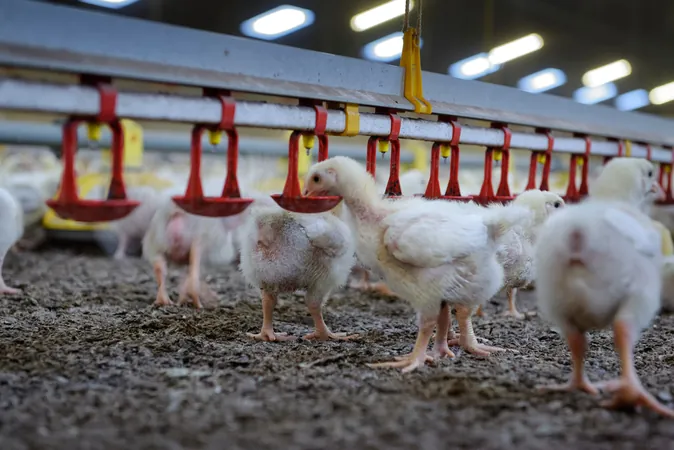
Innovative Rotation Strategy to Combat Poultry Infectious Bursal Disease (IBD)
2024-11-25
Author: Ming
In the battle against Infectious Bursal Disease (IBD), poultry producers and veterinarians are leveraging advanced strategies, particularly through the rotation of immune-complex vaccines and recombinant HVT-IBD vaccines. This innovative approach not only boosts flock health but also addresses challenges caused by animal diseases more effectively.
Immune-complex vaccines represent a game-changer in the arsenal against IBD. These vaccines are unique as they consist of a IBD virus vaccine shielded by antibodies, which gradually degrade to release the vaccine virus. This delayed response distinguishes them from traditional live vaccines and offers distinct advantages in poultry health management.
“Immune-complex vaccines are particularly beneficial when the field virus pressure is excessively high,” explains Leticia Frizzo da Silva, DVM, PhD, a leading scientist at Zoetis. “They essentially work by ‘cooling down’ the poultry house, thereby maintaining low field pressure for subsequent flocks.” Such vaccines effectively colonize the bursa, obstructing early replication of the virulent field virus. With continuous use, they can significantly replace the pathogenic field virus, ensuring that the farm predominantly harbors the vaccine virus, which is less harmful.
Comparing Vaccine Efficacies
These immune-complex vaccines offer a slower release mechanism, making them less susceptible to immediate neutralization by maternally-derived antibodies, a common issue with traditional live vaccines. This delayed release confers several key benefits:
1. **Enhanced Immune Response**: The strong vaccine-induced immune response mitigates the risk of maternal antibodies neutralizing the vaccine virus.
2. **Optimized Immunity Onset**: Immunity develops naturally, synchronizing with each bird's readiness to respond as passive immunity wanes.
3. **Reduced Immunosuppression**: The gradual release of the live vaccine virus ensures a robust immune response without the immunosuppression often linked to live vaccines, whether administered in ovo or shortly after hatching.
Moreover, combining both vectored IBD vaccines—which utilize herpesvirus of turkey (HVT)—and immune-complex vaccines can maximize protective outcomes. While HVT-IBD vaccines are proven to effectively manage clinical manifestations of the disease, they do not adequately supplant the environmental load of the field virus over time. Hence, implementing a rotational strategy combining both vaccine types stands out as a prudent and innovative solution.
Tackling Diverse Field Conditions
The IBD virus exhibits significant genetic diversity, with seven distinct genogroups categorized into classical virulent, antigenic variant, and very virulent types. This genetic variability necessitates tailored immune-complex formulations to address specific field challenges effectively. For instance, in broiler chickens, immune-complex vaccines based on the Winterfield 2512 and the V877 strains are particularly effective, while the V877 strain is recommended for layer chickens.
With these smart vaccination strategies, poultry producers can improve flock health, enhance productivity, and better manage the risks associated with IBD. As the poultry industry continue to combat this significant challenge, the implementation of a rotational vaccine strategy may become the gold standard for safeguarding avian health.
Stay informed about the latest strategies in poultry health management—this groundbreaking approach is just the beginning!


 Brasil (PT)
Brasil (PT)
 Canada (EN)
Canada (EN)
 Chile (ES)
Chile (ES)
 España (ES)
España (ES)
 France (FR)
France (FR)
 Hong Kong (EN)
Hong Kong (EN)
 Italia (IT)
Italia (IT)
 日本 (JA)
日本 (JA)
 Magyarország (HU)
Magyarország (HU)
 Norge (NO)
Norge (NO)
 Polska (PL)
Polska (PL)
 Schweiz (DE)
Schweiz (DE)
 Singapore (EN)
Singapore (EN)
 Sverige (SV)
Sverige (SV)
 Suomi (FI)
Suomi (FI)
 Türkiye (TR)
Türkiye (TR)